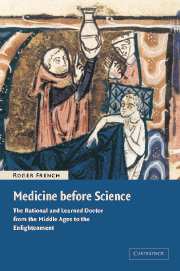3 - Medieval schools
Published online by Cambridge University Press: 10 December 2009
Summary
INTRODUCTION
The Latin medical tradition was a long time in forming. Medicine remained Greek with Galen, and might have become Latin with Celsus, but the loss of the Western Empire a little over two centuries after Galen's death meant the end of any elaborate form of Roman medicine. All of Celsus and most of Galen remained unknown until the Middle Ages. Learned and rational medicine survived in a Greek form in the Eastern Empire, which lasted a thousand years longer than the Western. The Eastern Empire tried to recover the Western by establishing exarchates, for example in Italy, and it seems to have been in such places that some Greek medical works were translated into Latin. There were two main centres of teaching in the east, Constantinople and Alexandria; there was an Alexandrian medical tradition in the Salerno area in the sixth and seventh centuries, and it is known that the Abbey of Montecassino received a copy of the Aphorisms as a gift in the tenth century. In the mid-twelfth century there were schools in Salerno favoured by Jews; there were Greek monasteries in the area; and the political and economic growth of Salerno also favoured its cultural development. But in the seventh century Alexandria was taken over for a brief period by the Persians and then by the Islamic Arabs, who very rapidly swept through North Africa, up through Spain (beginning in 711) and into Occitania.
- Type
- Chapter
- Information
- Medicine before ScienceThe Business of Medicine from the Middle Ages to the Enlightenment, pp. 59 - 87Publisher: Cambridge University PressPrint publication year: 2003



